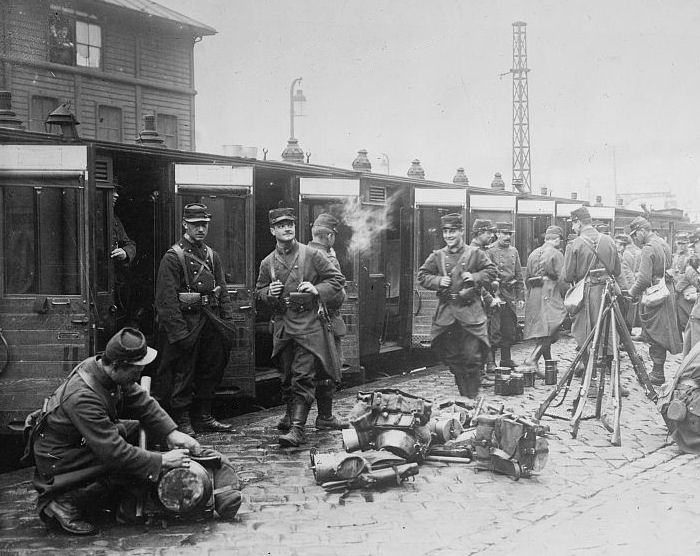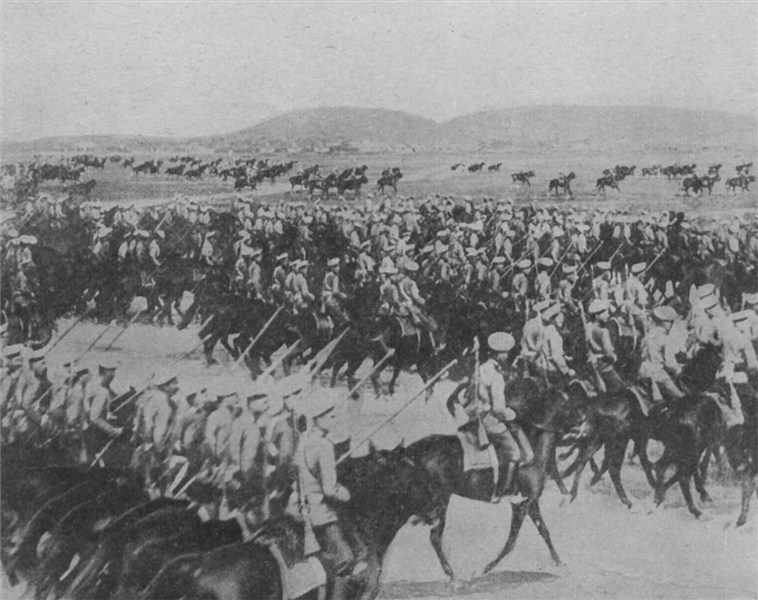Militarism was the belief in war as a solution to all conflict. Nations (motivated my nationalistic sentiments) competed for the best army and navy, as they had done in the past. Imperialism had encouraged militarism, since the glory that was gained by international expansion could seemingly be attributed to the superiority of a nations armed forces. Nationalism came into play with incredible strength as countries competed for lands in Africa and elsewhere. The sense of competition that hung over Europe brought about a network of alliances between nations. There were two main alliances: the Central Powers/ Triple Alliance of Germany, Austria and Italy, and the Allied Forces of Britain, France, and Russia.
 |
The Alliances:
Germany was united and industrialised in the years before WWI. Germany produced more steel than Britain or France combined. Frances still held resentment towards Germany for taking the lands of Alsace-Loraine in 1871. Britain resented the industrial competition of Germany.
Bismark created the Triple Alliance with Austria- Hungary, and added Italy. It was agreed that if one of these nations entered war, the other two would join in support. Bismark also made a treaty with Russia, but after Bismark the treaty fell apart. France then moved closer to Russia, and the two formed an alliance (despite the drastic differences between the countries) in 1894. When Germany started building a navy, Britain abandoned any ideas it had previously had to have an agreement with Germany.
British
and French governments then came to terms over their differences. British
control of Egypt was recognized by France, and French presence in North Africa
was recognized by England. In 1907 a humiliated Russia (defeated by Japan) was
agreeable to relations with England. Britain recognized the Russian sphere of
influence in the north of Persia, and Russia recognized a British sphere in the
south and east. Thus, the Triple Entente was formed.

The Naval Race:
In
1877 Captain Alfred Mahan,
American naval officer,he published The
Influence of Sea Power upon History.
The book analyzed the success of Britain as a nation, and attributed much of
this success to the superiority of the British Navy. He hypothesised that any
nation that wished to be powerful in the modern world must have an excellent
navy, for history showed that a strong navy was the key to a wealthy empire.

By 1914 Britain had 29 HMS Dreadnoughts, and Germany had 17.
 |
| The HMS Dreadnought |
The Balkans:
The Balkans were divided, and home to ethnic and religious disputes. The North was Romanian and Bularian, the South was Greek, and the middle was made up of Serbia, Bosnia, Croatia and Solvenia. Slavic nationalism (Yugoslavs) led to much discontent, and Serbia became the center for South Slavic agitation.
In 1908 the “Young Turk” revolution forced Sultan Abdul Hamid II to sign the Ottoman Constitution of 1877, bringing about a Parliament. This was an attempt to prevent further dissolution of the empire. At the same time, Russia looked to the Balkans after a defeat by Japan (wanted warm water port) and Germany wished to gain Bosnia. Secret terms were made between Austria and Russia; Russia would take Straits and Austria would take Bosnia. Serbia was frustrated by Austrio-Hungary's annexation of Bosnia and was forced to accept the annexation and restrain anti-Habsburg agitation by Serbian nationalists. Russia lost the backing of Britain and France, and did not take the Straits. Slav Nationalists grew frustrated.
In the first Balkan war (1911) Italy took Tripoli, and Bulgaria, Serbia, and Greece took Macedonia. In 1913 Austria, Serbia (Russian support) and Greece squabbled over Albania (Muslim).
Austria
was determined to keep Serbia land locked, which agitated the Serbs and
increased nationalistic sentiments. Albania became independent, and the
Russians were once again unable to help their “Little Brother Slavs”, the Serbs.
The Moroccan Crisis:
The First Moroccan Crisis was brought about after Kaiser Wilhelm II made a visit to Tangier Morocco and made a speech in which he supported the notion of Moroccan independence (1905). This challenged the French mandate of the country, which was incorporated into an agreement with England to split the Entente Cordial between them. This agreement had been signed a year prior to the Wilhelm’s speech, and marked the end to the imperial conflict that had existed between England and France. Germany felt threatened by the treaty between these two powers and thus attempted to disrupt the friendly relations by calling for free trade in Moracco. An international conference was held in Spain in 1906, where it was decided that France could control interests in Moroccan affairs, but also granted equality of trade and economic freedom for every nation and limited any colonial action of a nation without the signatures of the others.
In 1911, a second Moroccan Crisis flared after Franch violated the terms made by the 1906 convention by pushing troops into the country to defend the sultan against riots in Fez. Germany reponded by sending a warship to the port of Agadir, which intensified the enmity between the two nations and their allies.
Sarajevo Crisis, The outbreak of War
On June 28, 1914, Hapsburg Archduke Franz Ferdinand (heir to the Austrian throne) was assssinated by Gavrilo Princip. Princip was a member of the Black Hand, a Serbian terrorist group motivated by nationalism.
 |
| Franz Ferdinand |
 |
| Bang Bang |
 |
| Assassin: Gavrilo Princip |
Austria
moved to end Serbian nationalism, and was backed by the German support (the
“blank check). In Austria’s ultimatum, Austria demanded that it could
investigate Serbia’s actions, hinting that Serbian government could be involved
in the conspiracy. The strongly-worded ultimatum was presented to the Serbian
government on July 23, and put forth such severe terms that Serbia would be
compelled to refuse. For example, the ultimatum Officially condemned
anti-Austrian publications and propaganda, suppressed anti-Austrian societies,
and would dismiss any government officials that Austria might
name.
Serbia
claimed a violation of sovereignty and rejected the ultimatum, and mobilized the
Serbian army. Austria then declared war on Serbia on July 28, and on July 29 Russia mobilized troops against Austria and Germany. On August 1st Germany declared war on Russia. Germany declared war on France two days later. Germany violated the Belgian neutrality act by moving trough Belgium to invade France (Shleiffen plan), and on August 4 Britain declared war on Germany.




(What you are about to watch is somewhat relevant.)
No comments:
Post a Comment